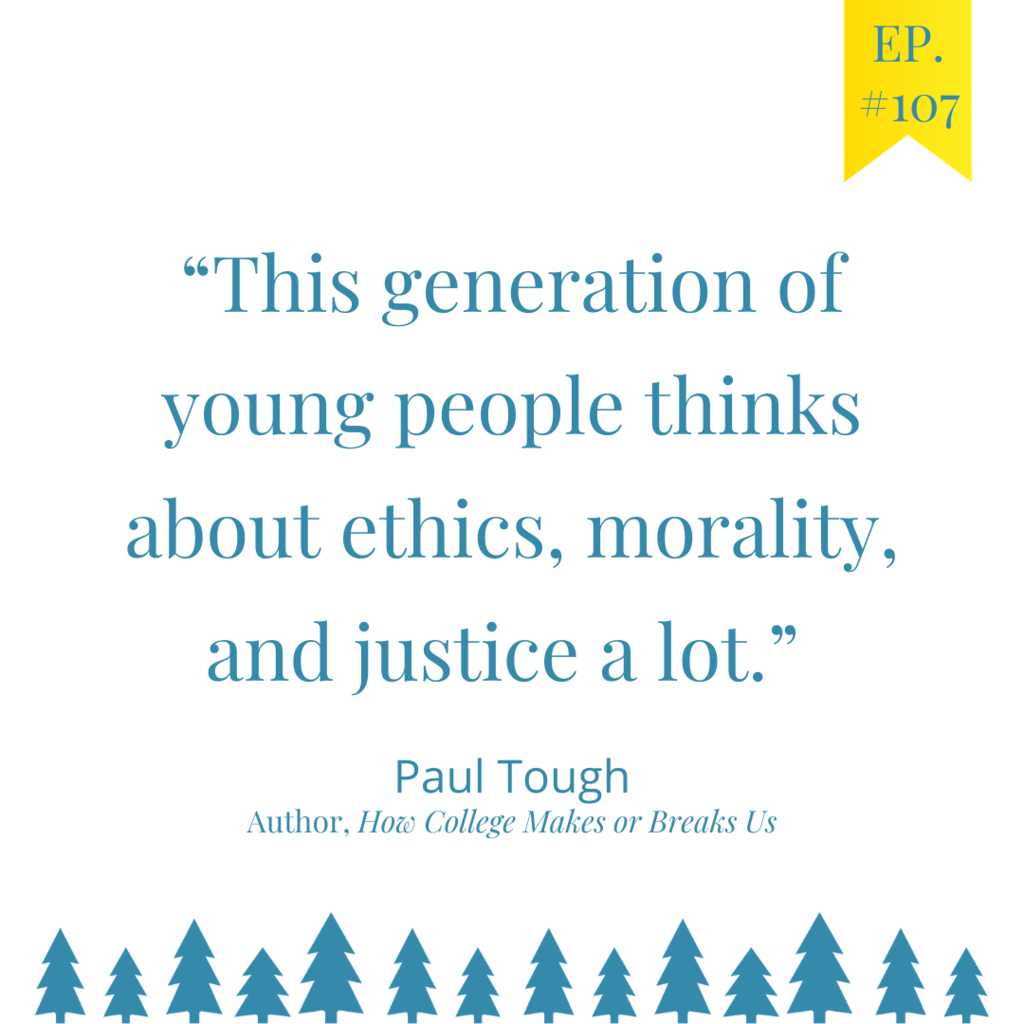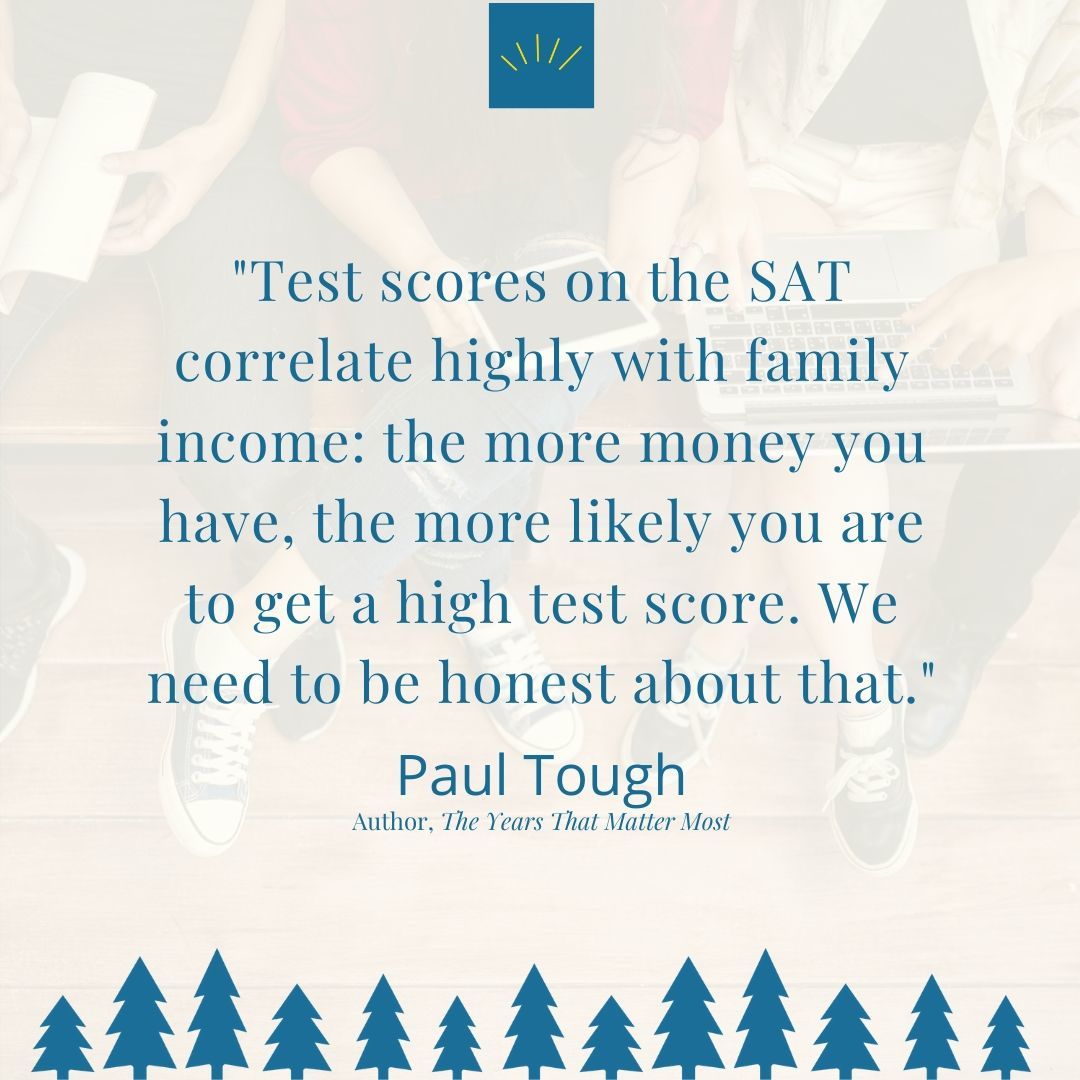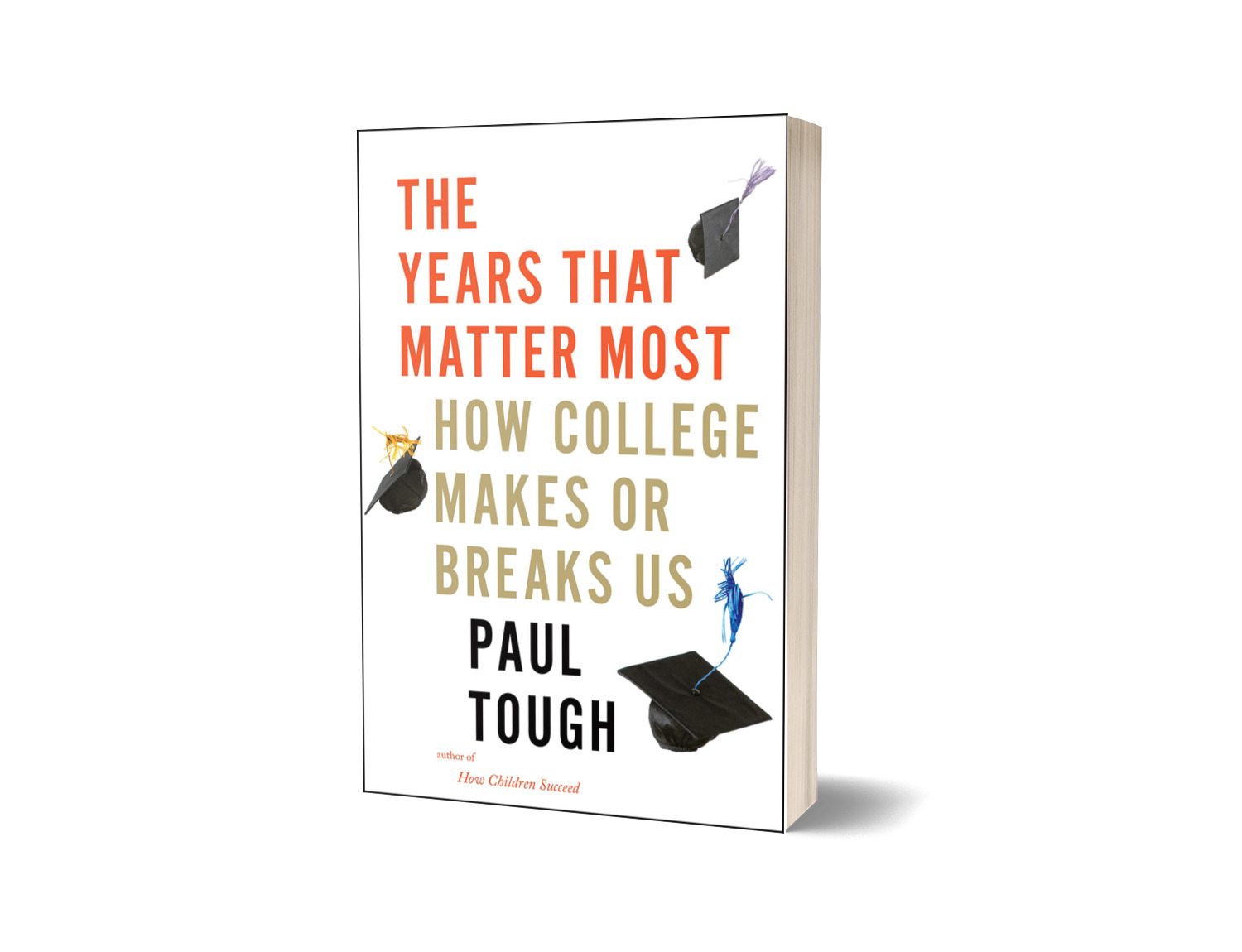Ep. 107: How College Makes or Breaks Us with Paul Tough
Sunshine Parenting - A podcast by Audrey Monke

Categories:
In episode 107, I'm talking with Paul Tough about his latest book, The Years That Matter Most: How college makes or breaks us, a powerful mind-changing inquiry into higher education in the United States. We talk about the state of higher education today and how can we help more young Americans achieve success.
Big Ideas
- Paul Tough's book examines the relationship between higher education and social mobility in the United States today and explores these questions:
- Does college still work?
- Is our system of high education fair?
- How can we help more young Americans achieve success?
- In the past, higher education was the great engine of social mobility but that relationship has broken down. Today it is viewed by many as an obstacle to social mobility.
- The most selective institutions, with the biggest endowments and budgets, almost exclusively educate affluent students, while low-income students mostly go to less selective community colleges and regional public universities that spend much less on each student and have much lower graduation rates.
- Studies show that some institutions spend as little as $4,000 a year per student compared to $150,000 or more on each student at elite, selective colleges.
- More money per student is spent in public high schools than in most public colleges.
- In the wealthiest zip codes, more students receive testing accommodations for learning differences than students from less affluent zip codes, which seems like one more advantage for the people who need them the least.
- While colleges strive to differentiate themselves by their facilities, endowments, and many other attributes, the ethical character of the institution should also be considered.
- Higher education is not a consumer good, it is a collective good.
- Tough proposes 3 solutions:
- Institutional change -- the level of admissions at private institutions needs to change. There should be pressure on them to admit more low-income students.
- Families should consider the global implication of their decisions and allow the culture to shift away from 'what's better for me' in the short-term to 'what's better for society' in the long-term.
- Public institutions need more funding and investment so that they can accommodate more low-income students and so that tuition rates don't continue to rise.
- Although the College Board has tried to change public opinion, they continue to be a force for inequity. The fact remains, the more money you have, the higher your test scores.
- Standardized test scores need to be given less weight.
- Test-optional institutions found that they were able to admit more low-income, first-generation students who graduate and succeed at the same rate as other students.
Quotes
Paul: "I think we have set up this system and there's no one villain that's responsible for the system. We all made it. It has inequities baked into and they're getting worse. It's clear now that there's this kind of stratification of institutions of higher education."
Paul: "We've heard a lot about how high tuition is at those private institutions, but the reality is that those institutions are losing money on each student. They spend more on each student than they bring in. That's because they believe it's going to pay off in the future when those alumni become rich donors."
Paul: "What is most remarkable to me about those numbers is that we pay for kids all the way through high school and then when they get to this more complicated, sophisticated, essential training for them to get ready for the workplace, we suddenly say, you can get by on a quarter as much as we were spending on you last year."
Audrey: "Our kids have gone to very good schools, and they chose them, but we weren't willing to jump through the hoops that we saw other people doing in order to get their kids into those (elite) schools. I was very put off by a lot of the ways other families dealt with things, especially around test prep."
Paul: "The overall fact that I think is so critical is that in reality, those students who are admitted to the most selective institutions are, as adults, making the most money."
Paul: "The reality is if you are a student at Stanford, if you work at Stanford, if you're part of that world, you are taking part in a system that is making the country more unfair. That's not just a Stanford thing. That's a reality at any of the similarly selective institutions."

Paul: "This generation of young people thinks about ethics, morality, and justice a lot and they should."
Paul: "The way they talk about race, identity, climate--it's inspiring. This is a generation that is putting ethics, and figuring out how to do the right thing, at the top of their priority list."
Paul: "When we look at higher education, we've been trained to see it as something that is a consumer good. If your kids benefit, then my kids fail. If my kids benefit, your kids lose out. That is not the way we used to think about higher education. It was a collective good."
Paul: "Considering the ethical quality of the system you're working in, and the system that you are applying to, is a really important consideration and I wouldn't be surprised if more and more young people start thinking about it."
Audrey: "We need high performing students at all the universities because that makes it more equitable. So if you're a super bright kid, you can actually benefit some of these larger public institutions in different states by getting some more brains there."
Paul: "In the fifties and sixties, students were choosing their colleges just based mostly on geography and as a result colleges were more like high schools. There was a mix of different performers--A students, B students, and C students--but then something changed. Those high performing students started to cluster together at just a few institutions."
Paul: "The algorithm that has been drummed into those students' heads is you just have to go to the most exclusive, most selective institution that will admit you. That worldview has created this stratification that is now so common in higher education."
Audrey: "Our kids are going to public institutions, not in our own state, which is crazy when you think about it. That is what a lot of families I know do because their kids can't get into the same schools that we went to when we were going to college."
Paul: "When we took that public funding away from the institutions in our own states, one solution they had was to begin admitting more out-of-state students because in-state tuition is less than out-of-state tuition...it just doesn't have the same kind of alignment between the mission (of public education) and the reality as I think it used to."
Paul: "The reality is that nothing's changed in terms of the relationship between the SAT and our class structure. Test scores on the SAT correlate highly with family income: the more money you have, the more likely you are to get a high test score."

Paul: "I think we need to be honest about the relationship between family income and SAT scores. Institutions need to find some way to take a more reasonable view of what those tests can do. We've given them way too much importance in our system."
Audrey: "I agree, they don't really predict anything. I've been working more on kids' social skills and character development because those things end up making kids more successful in their jobs and roles, wherever they went to college or whatever they majored in."
Paul: "You can sympathize with an admissions officer...All of this other stuff that we know is much more important in terms of evaluating a child and their potential is harder to put numbers on, harder to compare, whereas those numbers (test scores) just seem so tempting, so scientific. They look so nice."
Audrey: "This competitive thing just goes on at every level, whether it's the kids applying or the schools trying to have the highest averages, entering SAT and all that stuff."
Audrey: "I do think we need some major overhaul. Hopefully, 'varsity blues' and some of these things in your book will get us back on track so that our higher education system is doing what it's supposed to be doing for our country."
More from Paul Tough
"Working on this book was a remarkable experience: It took me six years to complete, and I reported in twenty-one states. The best part was getting to meet and hear the stories of so many remarkable young people — from the South Bronx to the affluent suburbs of D.C. to the Appalachian foothills of North Carolina — all of them trying to figure out how best to negotiate a path through the sometimes-treacherous landscape of American higher education.
In the book, I tell their stories — sometimes joyful, sometimes heart-rending, sometimes infuriating — and I do my best to place those stories into a larger context. I talked to dozens of economists and sociologists and educators who helped me understand why our system of colleges and universities functions the way it does — and why it so often seems unbalanced and unfair."
PBS News Hour: Admissions scandal highlights 'disconnect' between colleges' message and action
Amazon: The Years That Matter Most: How College Makes or Breaks Us
Related Podcasts & Posts
If you liked this podcast episode, listen to:
Ep. 79: Thoughts on the College Admissions Scandal
Ep. 34: Advice on College, Transferring, and How to Support Your Kids with Their Decisions
Ep. 21 Advice for the College Application and Selection Process
Read Conversations before College: WHO you are matters more than WHERE you go
Don't miss my Happier in Hollywood Podcast: Ep. 123 Happy Camper at Work

